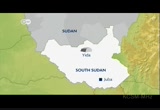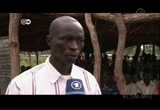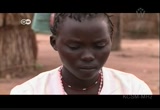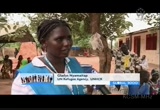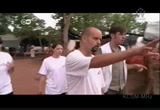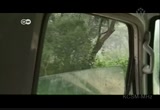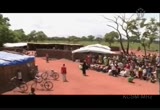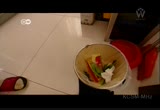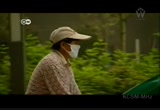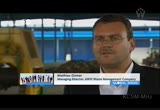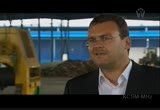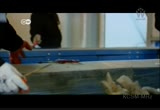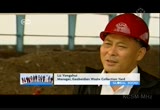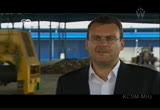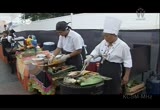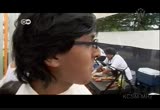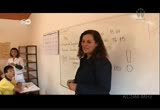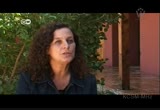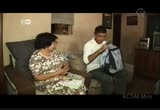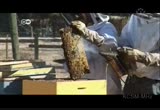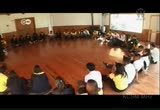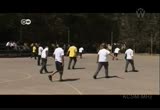tv Global 3000 KCSMMHZ September 11, 2012 2:00am-2:30am PDT
2:00 am
>> hello and welcome to global 3000, your weekly check on global developments that affect us all. today we explore the challenges people are facing in the youngest state in the world. and why southern sudan is still far from stable. here's what's coming up: between hope and fear -- we visit a refugee camp in southern sudan smell of change -- how china is reforming its waste management and off the street -- we visit a woman in chile who brings street kids back to school
2:01 am
some 44 million people are currently on the run from conflict or some form of persecution -- that's according to united nations estimates. and this number is growing every day. when southern sudan seceded from the north in july 2011, everyone knew it would never be easy. ethnic divides and access to the oil resources in the newly created border area keep fuelling regional conflicts. hundreds of thousands of people are on the run. some 70 thousand alone have fled to a refugee camp in what used to be the small village of yida. the camp promises relative safety. but southern sudan is far from able to control the situation let alone provide for refugees. so international aid agencies are taking on the challenge. for the refugees, arriving in the camp is the end of a terrible journey, but it's also the beginning of a life in limbo.
2:02 am
>> lesson time in the refugee camp. hunger has brought these pupils here. the hunger for food -- and knowledge. nemat ayub is 14 and came here on her own. she walked the 200 kilometers to yida, in south sudan. >> we have escaped from the war. and because we are teachers from the mountain, we are now trying to assist our the children as well as possible. >> getting to yida isn't easy. our trip coincided with the rainy season and the entire region was flooded. our flight was delayed three times, so we had to wait for days. but finally we took off for yida -- a village that's now home to almost 70,000 refugees. nemat ayub is one of almost 3,000 children who've come here without their parents. they live in this camp and are cared for by the un refugee agency unhcr. gladys nyamai-tap is herself a
2:03 am
former child refugee. twenty years ago she fled the civil war in southern sudan and crossed into neighboring kenya. so she understands the hardships these children face. they live in cramped quarters with no proper beds or shoes. there's no variety in their diet -- they eat millet every day. like the others, nemat has no money to buy vegetables or meat. she tells gladys that she came here with a small group of children, led by her older brother. nemat's village came under fire and her brother and uncle were killed in front of her eyes. she doesn't know what's happened to her parents. nemat misses them terribly and longs to go back to the mountains to search for them. gladys tries to console nemat and says that maybe her parents are here at the camp. she promises to look for them. yida is swimming in mud. during the rainy season conditions here are catastrophic. yet the camp now houses 70- thousand refugees.
2:04 am
half a year ago, there were just one-fifth that number. aid agencies can barely cope and gladys struggles to keep up with the latest developments. like an outbreak of trachoma, a contagious eye disease transmitted by direct human contact and by flies. left untreated it can cause blindness. many of the victims children >> we found out that most of the children are suffering from eye problems. you can see the swelling on this child here. we've discovered five cases since yesterday. >> médecins sans frontières or doctors without borders has set up a mobile clinic here. but trachoma isn't the worst problem its physicians face. many patients suffer from diarrhea, especially young children. >> right now we're seeing children come to us when it's almost too late. they've already become very weak. we even have children who've already gone into shock. so we witness children die in our ward almost every day. naturally we do our best, but our resources are limited.
2:05 am
>> doctors without borders is trying to fly in more personnel, to improve conditions. the aid organization is expanding its operations here -- even though it has already come under attack from [north] sudan. last november bombs were dropped on yida. newcomers to the camp are getting a tour. the hospital used to be run by two doctors and six international aid workers. their numbers have doubled, but they're still understaffed. >> you can see here that the sanitation and hygiene situation is unbearable. it's at the crisis level. it's a medical emergency in terms of the number of children who die. >> contaminated drinking water is often to blame. while the well water is clean, the containers the refugees use are often not. >> this is one of the jerry cans that we are tryig to avoid. because they fetch water in this jerry can and leave it open. so the flies get in and the water gets contaminated, and
2:06 am
then they just drink it. it's one of the things causing diarrhea. >> cholera hasn't broken out yet, but the danger is growing. more and more people are fleeing from the sudanese province of south kordofan. we drive towards them and try to reach the border and the city of jaw. but the route is almost impassable. we keep sinking into the mud and the rain doesn't help. the bordertown of jaw consists of a few dilapidated huts. soldiers from the south sudan people's liberation army are everywhere. we're not permitted to interview or film them, but they kept walking in front of our camera. they're here to provide security. the last attack from the north occurred around three months ago. not everyone could hide in underground shelters like this; some 80 residents were killed. still, most of the refugees feel safe when they arrive here in south sudan.
2:07 am
they rest a bit and recover from their long journey. this woman says they've been walking for three days and have used up almost all of their rations. she also reports bombing by the north sudan army. the women's husbands have either died or are fighting with the rebels. it will take these people another day to reach yida, where they can register as refugees and will be given ration cards. gladys asks about nemat's parents. she learns there are people named ayub at the camp, but they're not from nemat's village. gladys gives nemat the bad news. nemat's torn between homesickness and the desire to go to school in a safe environment. she tells gladys she wants to become a doctor -- and save as many lives as possible. >> in china waste management largely still means throwing all your rubbish in a skip and
2:08 am
dumping it somewhere on a landfill in the countryside. many nations still dispose of some of their waste this way. but with increasing consumerism comes a growing awareness that we will run out of countryside, clean air and clean water unless we find new ways to manage our waste. the chinese government responded by introducing environmental guidelines several years ago. but for the most part these are ignored. but one region south of beijing is currently implementing a new waste management system with the help of a german company. and it is hoping this new concept might soon catch on in other parts of china. >> this is gaobeidian, located some 80 km south of beijing. it's a small city by chinese standards. around 600-thousand residents live in its metropolitan area. and all of them produce garbage.
2:09 am
the more affluent they are, the more waste they generate. china's rapid growth is creating an environmental nightmare. not very many towns and villages offer professional garbage removal like they do in gaobeidian. and it's only just begun here, too. many communities are hesitant to introduce garbage removal systems because it costs them money. trash in china doesn't yet contain many recoverables. it mostly consists of food waste and low-grade plastics. firms which produce valuable waste often sell it privately -- or garbage pickers collect it from rubbish bins. in gaobeidian people gave little thought to what happened to food scraps, or biological waste -- as long as it wasn't rotting on their own doorstep. >> people used to just drop their garbage off at the nearest corner and it just piled up for a while. sometimes a truck would come by
2:10 am
and take it away. at other times the city would just burn the trash. today it's better. our garbage is picked up and brought to a real waste treatment plant, and disposed of properly. >> there's now a rubbish bin in front of every building in the city and it's emptied regularly. that's part of gaobeidian's new waste disposal concept. but it'll be some time before systems like this will be in place across china. in the countryside and in many small towns they don't have the infrastructure to organize such garbage collection schemes. local officials often lack the environmental awareness as well. environmental protection doesn't come cheap and is often seen as hampering growth and profit. so few here give it much thought. in gaobeidian, too, the push for change came from abroad. the awn waste management company from southern germany developed
2:11 am
the city's professional garbage collection system. the waste disposal plant on the city's outskirts is central to this concept. part of an international initiative to reduce global warming, it was funded by the german environment ministry. by the end of 2012, the plant will be run entirely by the chinese, though germans will still serve as advisors. >> the city of gaobeidan assumes the costs of running the waste treatment plant. we provide the know-how. we bring the specialists to process the garbage, to recover the valuable materials we retrieve from the waste. >> you can tell how rich a society is from its garbage -- gaobeidian's doesn't contain much of value. the processing area smells awful, as many greenhouse gases are being produced. in most regions of china
2:12 am
garbage is dumped untreated into pits or piled up to form mountains of trash. this isn't just unsightly, it also contributes to climate change. so treating the garbage is important. >> methane is one of the most environmentally harmful gases in existence. seen from a global perspective, around 10 percent of these damaging gases come from landfill sites. that's why, with this plant, we're trying on one hand to recover valuable materials from the garbage and recycle them. on the other, we're trying to stabilize the organic matter found in the garbage so it won't produce any more methane gas. >> methane is a greenhouse gas some 20 times more harmful to the environment than co2.
2:13 am
so it's best to prevent it from being produced in the first place. and this can be done quite cheaply. in germany, it costs up to 1000 euros to reduce co2 emissions by one ton. the operator of this facility says he can achieve the same results for less than 10 euros. the plant was designed to meet the needs of the chinese. people do the final sorting of the garbage, to recover any valuable materials. these employees formerly earned their livings as garbage pickers on the streets. professionalizing gaobeidian's trash collection systems drastically reduced their incomes, so they now work at the plant. >> the advantage of working here is that i work shorter hours than i did before. outside i picked through garbage day and night. now it's just 8 hours -- and i earn more money.
2:14 am
>> after the sifting and sorting comes the most vital part of the operation, as far as environmental protection's concerned. the residual waste is moved about and aerated. this prevents the occurrence of chemical reactions which produce methane gas. and this means the garbage also doesn't stink anymore. >> with this new technology we can treat the waste properly for our citizens. now there's an official garbage dump here; the waste is pulverized and then put into a landfill. the many illegal dumps which destroy the countryside have disappeared and there's less environmental pollution. >> the remaining waste is inspected regularly. measuring probes are used to monitor the process of decay. if necessary, the waste will be aerated again. this is done using pumps which force air through underground
2:15 am
pipes. the air then comes out through small holes in the ground. today everyone's happy with the project -- but it was hard to get it off the ground. >> the catalyst for such projects was really pressure exerted by china's central government to do something to protect the environment. but during the course of the realization, you can see people's mindsets change. they gradually become proud of their projects. >> if matthias ginter had his way, every city in china would have a waste treatment facility like this. he hopes others will now follow gaobeidian's example. >> and now its time to tickle your tastebuds with another global snack. whenever our reporters travel the world we ask them to bring back the no-fuss foods people like to enjoy around the globe. and today we tackle tackatschos in chile.
2:16 am
>> for today's global snack we've travelled to the peruvian capital, lima. this coastal city is a cultural melting pot. to demonstrate the diversity of peruvian cuisine, lima has set up a culinary boulevard. yasmin losano and her son marco cook here. they both hail from the amazon. marco is currently studying dance and theatre, but still loves to help his mother cook. >> i fry the bananas when they're still green. then i add some salt and mix them with pork drippings.
2:17 am
after i've mashed it all up, i form it into a ball -- and that's the finished tacacho. a ball, that's it. >> tacachos are usually served with wieners, other grilled or fried meats, and spicy vegetables. they make a hearty meal. >> buen provecho! >> we're actually from tarapoto, in the rainforest. my mother brought the recipe with her. we've had our stand for four years. i only learned to prepare tacachos when we came here. >> but for his mother yasmin, running their stand is about more than just making money. she considers her region's cuisine to be an important part of its cultural heritage -- and cooking to be her calling.
2:18 am
>> i'm very proud to be able to represent my region of st. martin here. this way we can pass our culture on to our children. >> peruvian cuisine employs an astonishing variety of vegetables, fruit, meat and fish. >> why i like it? 'cause it's all mixed together. you get to eat so many different things in a single dish. >> no wonder that, when it comes to food, peru is called the "france" of latin america. >> and if you'd like to share your snack recipes, do get in touch. here's how it works. >> savory or sweet, heavy or
2:19 am
light -- what is your take away of choice? send us a photograph of your favorite snack and when our global snack apron. send your photo by post or by e- mail to global3000@dw.de. best of luck. >> chile is one of richest countries in latin america. and yet most families who can afford it try to avoid the state-run education system. instead they pay tens of thousands of euros a year to get a good education for their kids privately. many parents and students alike have been protesting against this two class system. for months they've been calling on the government to invest more money in training up the next generation. one woman decided not to wait for the state to respond and used her own funds to bridge the growing education divide. >> a new school year is getting under way at mary anne müller prieto's school in santiago de chile.
2:20 am
120 young people have enrolled and the executive director is here to welcome them. >> buenas tardes jovenes! buenas tardes profesora. me voy a presentar, mi nombre es mary anne müller. yo soy la directora executiva de la fundación origen. >> here pupils are taught not only math and literature but also values like peace and tolerance. most of the young people here come from poor or disadvantaged families. >> in chile, access to quality education is very unequal. the better schools are usually private and therefore too expensive for a large part of the population. so many children are at a disadvantage from the start. at mary anne müller prieto's school there are no tuition fees. she founded the school and the foundation that runs it in
2:21 am
1991, and has poured much of er personal wealth into the project. the mother of three believes everyone has a right to a good education. many of her pupils are orphans or former drug addicts. >> we only accept the youths with the biggest problems -- those with socioeconomic difficulties, who've previously been discriminated against and dropped out of other schools. here they have the best chance to make something of themselves. the same goes for those in dire financial straits. >> like gustavo rojas, for example. attending this school is the only way for him to learn a profession. the 17-year-old is completing his degree this year. later he'd like to go to university and become an engineer. for someone with his background
2:22 am
that's close to impossible in chile. that's because gustavo comes from the "población" or slums on the outskirts of santiago. his parents died when he was just a boy, so a friend's grandmother took him in. >> hola senora. >> she cares for gustavo but has no money to pay for his education. she has two children of her own and just gets by on her meagre pension of 200 euros a month. >> sure i've had a hard life, but i've still got to pull myself together. and this school has helped me do it. i could go to the psychotherapist. they've supported me in many different ways.
2:23 am
>> an organic farm is part of the school. when they graduate, students also receive a technical degree in agriculture with a specialization in organic farming. >> hola, chicas, como estan? >> the young people run the farm themselves and produce their own products, including organic honey. they also grow vegetables and sell part of their crop at markets in santiago. the proceeds are used to finance school projects. it's all part of the school's holistic approach. >> basically, that's at the heart of our philosophy: that everyone should have a place where they feel comfortable and can further their their own talents. no one is superfluous.
2:24 am
no one should be shut out of society just because he's different or has problems. all young people possess great potential which we want to develop together. >> mary anne müller prieto is a buddhist. once a week she gives classes in meditation and yoga. but she doesn't do it to convert people to her religion. instead she hopes to show her pupils how to resolve their inner conflicts. most of the young people here find this tough to do.
2:25 am
and that proves a big challenge for the school's director. >> we can't change these children's world: the poor neighborhoods they grow up in. what we can do is to ensure that they make the right decisions in life. >> the concept appears to be working. some 400 pupils attend the school each year and none drop out. and half of the graduates are accepted at universities throughout chile. >> and we'll be back next week with more ideas for for future- proof concepts of living. we hope you'll tune in for that. but for now from me and all the crew here in berlin thanks for watching and bye bye! captioned by the national captioning institute --www.ncicap.org--
40 Views
IN COLLECTIONS
KCSMMHZ Television Archive
Television Archive  Television Archive News Search Service
Television Archive News Search Service 
Uploaded by TV Archive on

 Live Music Archive
Live Music Archive Librivox Free Audio
Librivox Free Audio Metropolitan Museum
Metropolitan Museum Cleveland Museum of Art
Cleveland Museum of Art Internet Arcade
Internet Arcade Console Living Room
Console Living Room Books to Borrow
Books to Borrow Open Library
Open Library TV News
TV News Understanding 9/11
Understanding 9/11
